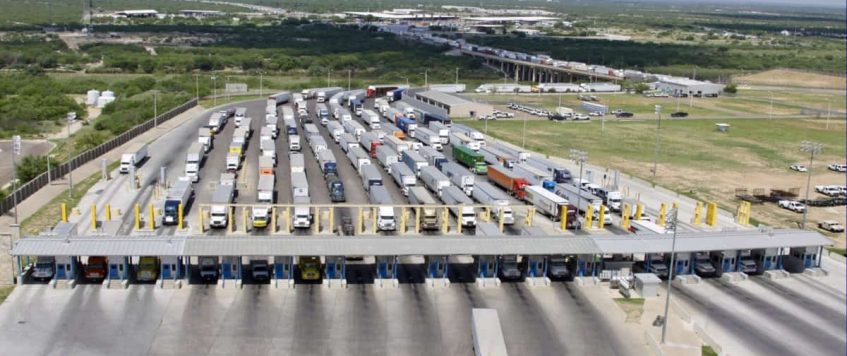-
17
Sep
Borderlands: Mexico Remains Top US Trade Partner in July, Laredo No. 1 Gateway
The partnership between Mexico and the United States continues to solidify with Mexico being the top U.S. trade partner in July at $65.3 billion, a 0.24% year-over-year (y/y) increase.
It was the seventh time in the past eight months Mexico ranked No. 1 in monthly international commerce with the U.S., according to the latest data from the U.S. Census Bureau.
Mexico’s trade with the U.S. year to date is $462 billion, ahead of Canada at $450.3 billion and China at $322.3 billion.
If Mexico holds on for the rest of 2023 as the top U.S. trading partner, it would only be the second time in history the country has done so. The first time was 2019, when U.S.-Mexico trade totaled $612.8 billion, compared to Canada’s $611.4 billion and China’s $555.6 billion.
From the 1970s through 2014, Canada was the top trading partner of the U.S. China earned the No. 1 ranking from 2015 through 2018. Canada regained the top spot in 2021 and 2022.
Nearshoring of manufacturing to Mexico is helping to boost cross-border trade with the U.S., according to Patty Hinojosa, vice president of Mexico sales and operations for CargoQuotes.
“We have recently witnessed a remarkable surge in partnership requests from new manufacturing plants in the [Mexican cities] of Ramos Arizpe and Monterrey areas,” Hinojosa said. “These companies are gearing up to roll out their first batch of final products to their eager customers in the USA.”
CargoQuotes, based in Lee’s Summit, Missouri, is a full-service freight brokerage specializing in cross-border shipments.
The manufacturing sector in Mexico has already attracted almost $10 billion in foreign direct investments in the first eight months of 2023, according to Statista, compared to $13.7 billion in all of 2022.
For the sixth straight month, Laredo, Texas, retained the No. 1 spot among the nation’s 450 international gateways for trade, according to WorldCity.
Laredo recorded $26.1 billion in two-way trade during July, with Mexico commerce accounting for $25.4 billion, according to the latest U.S. Census Bureau data analyzed by WorldCity.
The Port of Los Angeles ranked No. 2 with $24.3 billion and Chicago O’Hare International Airport was No. 3 and reported $24.2 billion in trade.
As nearshoring efforts continue to ramp up in Mexico, there are signs of growing pains, according to Jordan Dewart, president of Redwood Mexico. Redwood Mexico is the cross-border shipping arm of Chicago-based fourth-party logistics provider Redwood Logistics.
Dewart said the demand for cross-border trucking capacity continues to climb but is being affected by rising diesel costs, Mexican driver shortages, cargo theft and the dollar/peso conversion depreciation, which have contributed to increased shipping per mile and interest rate charges.
Rates for shipments crossing the Texas-Mexico border averaged $3.08 per mile, according to the Department of Agriculture, compared to the U.S. domestic average of $2.09.
“If logistics service providers and shippers are complaining about high interest rates in the U.S., roughly 6%, it’s double that in Mexico,” Dewart said. “Mexican carriers are not rushing out to expand their fleets while they’re at capacity. This hasn’t created an unrecoverable issue at present, but if proper investments aren’t made now there might be similar disruption on the roads compared to what was experienced at the ports in 2020 through 2022.”
Dewart said as U.S.-Mexico trade continues to increase, the disparity between the dollar and peso should ease, but shippers should be proactive with locking in freight rates.
“Current shipping rates and interest rates that logistics service providers and shippers are experiencing are exorbitant,” Dewart said. “The expectation is for it to continue as manufacturers experience growing pains in their nearshoring moves. Shippers who are asking for their rates to be lowered this summer are being urged by Mexican carriers to up their rates and lock them in for the next three years to avoid seeing market rates skyrocket.”
Production, exports of Mexican-built trucks slip in August
After seven consecutive months of growth, Mexico’s monthly truck production and exports declined in August, according to data from Mexico’s National Association of Bus, Truck and Tractor Producers (ANPACT).
The production of heavy-duty trucks decreased 3.9% y/y to 19,413 units, while exports fell 15% y/y to 15,114.
ANPACT President Miguel Elizalde said the declines were not indicative of a slowing market.
“These figures are lower than last year, but it does not mean that it is a downward trend, rather, the number of vehicles that were produced in August 2022 were very high, so if we compare it month by month, production was lower,” Elizalde said during a recent video news conference.
The U.S. was the overwhelming destination for trucks produced in Mexico during August, accounting for 96% of exports, followed by Canada at 2.5% and Colombia at about 1%.
The 10 truck makers and two engine producers in Mexico that are members of ANPACT include Freightliner, Kenworth, Navistar, Hino, International, DINA, MAN SE, Mercedes-Benz, Isuzu, Scania, Cummins and Detroit Diesel.
Maersk teams with Fabric to open Dallas e-commerce center
Container shipping giant Maersk has opened an automated-fulfillment center in Dallas, powered by robotics solutions and technology from Fabric.
The 38,000-square-foot facility features an AI-driven, automated e-commerce fulfillment solution aimed at maximizing warehouse productivity while minimizing real estate footprint requirements, according to Erez Agmoni, Maersk’s global head of innovation for logistics and services.
“The growth of e-commerce continues to reshape the retail landscape,” Agmoni said in a news release. “As we look to help our customers streamline their supply chains end-to-end, we see Fabric’s automated fulfillment solution as one that is highly capable of meeting the demand for efficient warehousing and fulfillment where labor and real estate resources are scarce.”
Tel Aviv, Israel-based Fabric is a retail technology company that provides intelligent robotic fulfillment systems. Denmark-based Maersk business activities include shipping, port operation, supply chain management and warehousing.
Cargo checkpoint opens at Texas border port of entry
Officials from both sides of the U.S.-Mexico border recently inaugurated a new $3.6 million checkpoint on the Mexican side of the Colombia Solidarity International Bridge aimed at speeding up crossing times for both pedestrian and cargo trucks.
The bridge connects Laredo with the city of Nuevo Laredo, Mexico.
The checkpoint was developed by officials from the Mexican state of Nuevo Leon, with input from the U.S. Border Patrol and Customs and Border Protection. It includes two lanes for pedestrian vehicles, three lanes for commercial vehicles and inspection booths for each lane.
By: Noi Mahoney / FreightWaves

